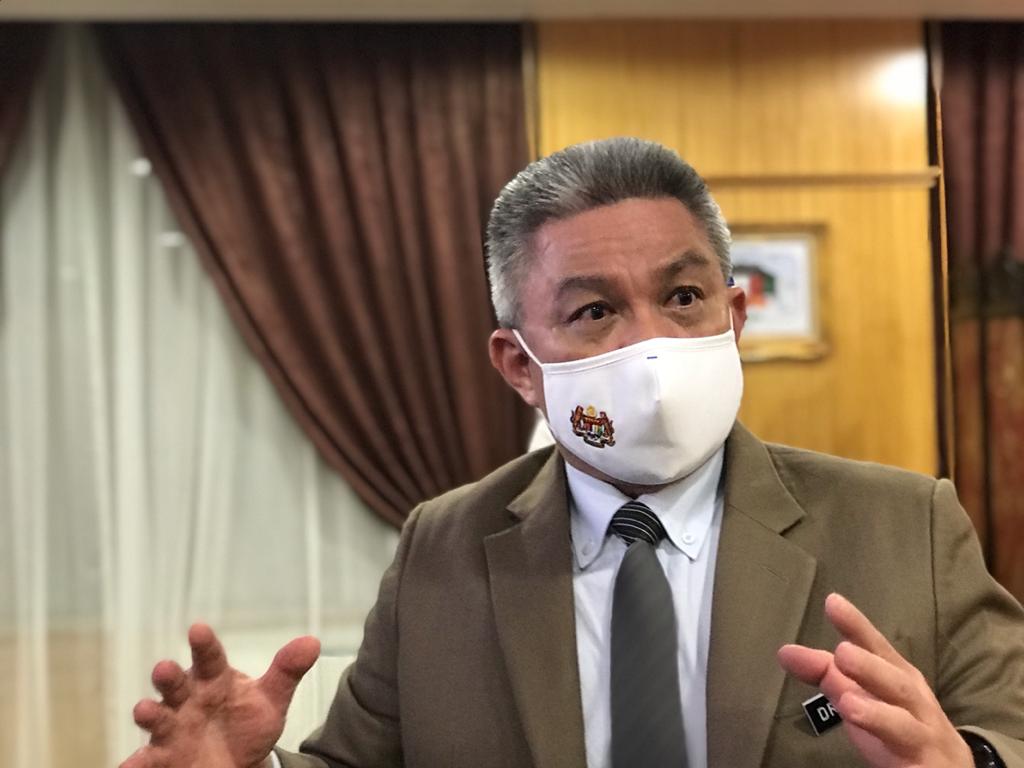PUTRAJAYA, Feb 11 — The Cabinet has decided that all foreign nationals living in Malaysia can get vaccinated against Covid-19 at no charge like Malaysian citizens in a bid to reach herd immunity against the dangerous pathogen.
Health Minister Dr Adham Baba said foreign residents would receive their shots simultaneously with Malaysians under the national Covid-19 vaccination programme according to priority groups. Irrespective of nationality, frontline workers would be vaccinated in the first phase, followed by the elderly and those with underlying medical conditions, before the general public.
“We made a Cabinet decision just now that we will vaccinate all foreigners in our country,” Dr Adham told CodeBlue in an interview at his office yesterday.
“We are giving it for free — because we want to achieve herd immunity. If we don’t immunise them, they may be a source of infection. We have a mechanism on how the private sector will help us, to enable us to give the vaccines for free,” he added.
About 100 private clinics in Penang have reportedly offered to provide free Covid-19 vaccination services.
Science, Technology and Innovation Minister Khairy Jamaluddin said separately today that the foreigners covered under the national Covid-19 inoculation campaign included diplomats, expatriates, students, foreign spouses and children, foreign workers, UNHCR card holders.
“In principle, Cabinet has also agreed to provide the vaccines free for undocumented foreigners. The JKJAV (Covid-19 Vaccine Supply Access Guarantee Special Committee) will be discussing further on how this can be implemented. We will be reaching out to state governments, foreign embassies, NGOs to assist,” he tweeted.
Dr Adham said that populations living in prisons and detention centres — which have regularly reported coronavirus outbreaks — will also receive Covid-19 vaccines.
Dr Adham previously said that the third wave of the Malaysian epidemic saw 157 Covid-19 clusters in the manufacturing sector, among the highest among workplace outbreaks. Migrant workers are particularly vulnerable to coronavirus infection due to their cramped living conditions.
The health minister also said that Malaysia would receive Pfizer’s coronavirus vaccines before February 26 to kickstart the national Covid-19 vaccination programme, though he did not specify the amount of doses in the first shipment or when exactly it would be delivered.
When asked if the European Commission has given a guarantee that Pfizer-BioNTech shots would be supplied to Malaysia on schedule, amid the European Union’s (EU) Covid-19 vaccine export controls, Dr Adham said US pharmaceutical company Pfizer was assisting the Malaysian government on this.
“Malaysia has a very long and understanding business relationship with Pfizer,” he told CodeBlue.
CodeBlue previously reported Khairy’s office as saying last Friday that Pfizer would send the European Commission an application for export authorisation to deliver vaccines from its manufacturing plant in Belgium to Malaysia.
The EU recently said it would not block Covid-19 vaccine shipments to Australia that is expecting delivery of Pfizer vaccines by the end of the month, as well as AstraZeneca shots by early March. The EU has also approved the first Pfizer vaccine shipment to Japan.
As for the AstraZeneca vaccines, Dr Adham said the doses Malaysia was purchasing through the global COVAX plan would be manufactured by South Korea’s SK Bioscience, whereas the vaccines ordered directly from the British-Swedish pharmaceutical company would be supplied from Thailand.
Siam Bioscience is manufacturing AstraZeneca vaccines, as The Nation reported that the Thai company and AstraZeneca have committed to making the vaccine available in Southeast Asia.
Dr Adham also told CodeBlue that Pharmaniaga Bhd and Duopharma Biotech Bhd — which are undertaking the fill-and-finish process, the final stage before the vaccine is delivered to consumers, for China’s Sinovac and Russia’s Sputnik V vaccines respectively — must apply for a licence from the National Pharmaceutical Regulatory Agency (NPRA) for their fill-and-finish facilities for human vaccine production.
“And we have to see the GMP (good manufacturing practice) of their factory.”
China’s CanSino Biologics Inc, meanwhile, must liaise with their appointed vaccine holder in Malaysia to distribute their Covid-19 vaccines here, said Dr Adham. CanSino’s one-shot vaccine showed 65.7 per cent efficacy, according to an analysis of late-stage trials.
The health minister said the NPRA was currently using rolling submissions by Sinovac and CanSino to evaluate data submitted by the pharmaceutical companies on their vaccines while trials are being conducted. The Gamaleya Institute has already submitted a dossier of clinical trial data on its Covid-19 vaccine to the NPRA for approval, but it must first be translated from Russian.
Sinovac has produced mixed trial results on its vaccine so far, with the latest Brazilian clinical trials showing 50.4 per cent efficacy. Russia’s Sputnik V vaccine has shown 91.6 per cent effectiveness in preventing symptomatic Covid-19, according to an interim analysis of Phase 3 trial results published in The Lancet.
Pfizer-BioNTech’s vaccine is 95 per cent effective in preventing symptomatic Covid-19, while AstraZeneca’s vaccine is 82 per cent effective with the second dose given 12 weeks after the first.
When asked if Malaysia would change its Covid-19 vaccination strategy to focus on protecting the vulnerable from severe disease and death — rather than herd immunity — in light of reduced vaccine effectiveness against new coronavirus variants such as the South African one, Dr Adham said the South Africa and Brazil variants have yet to be discovered in Malaysia. Just two cases of the new UK strain have been reported here so far.
Update at 11.55am: The story has been updated with Khairy’s comments in paragraphs 6 and 7.








